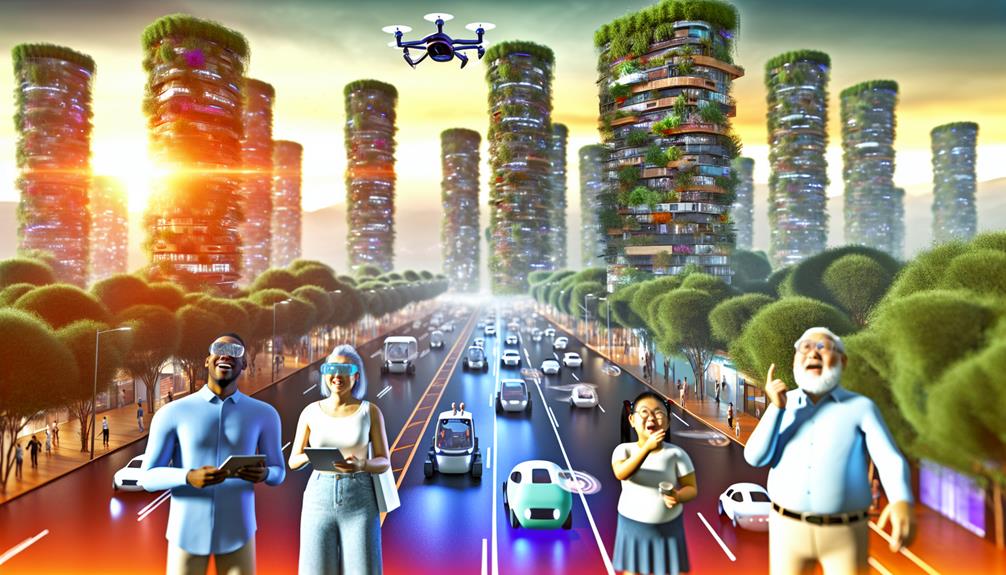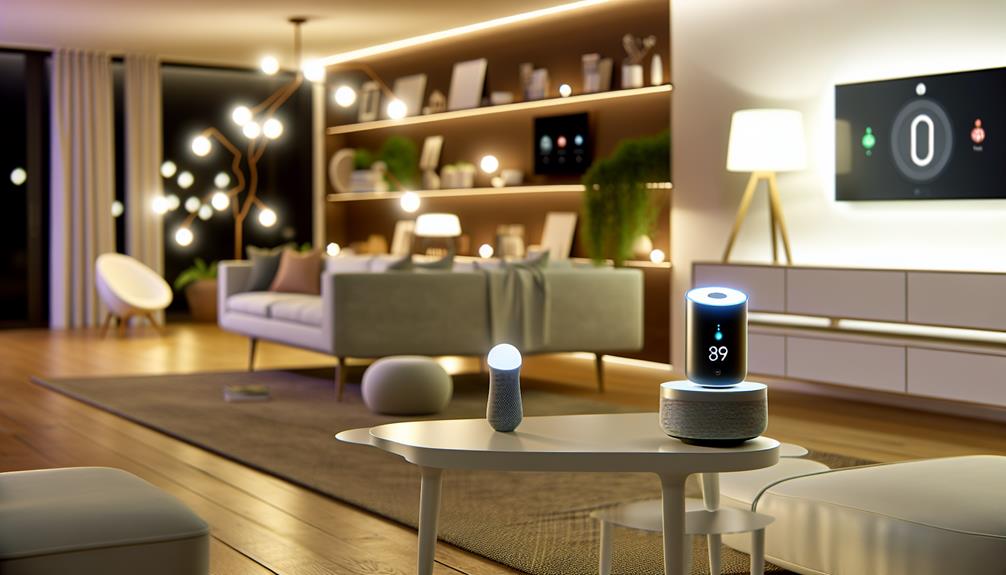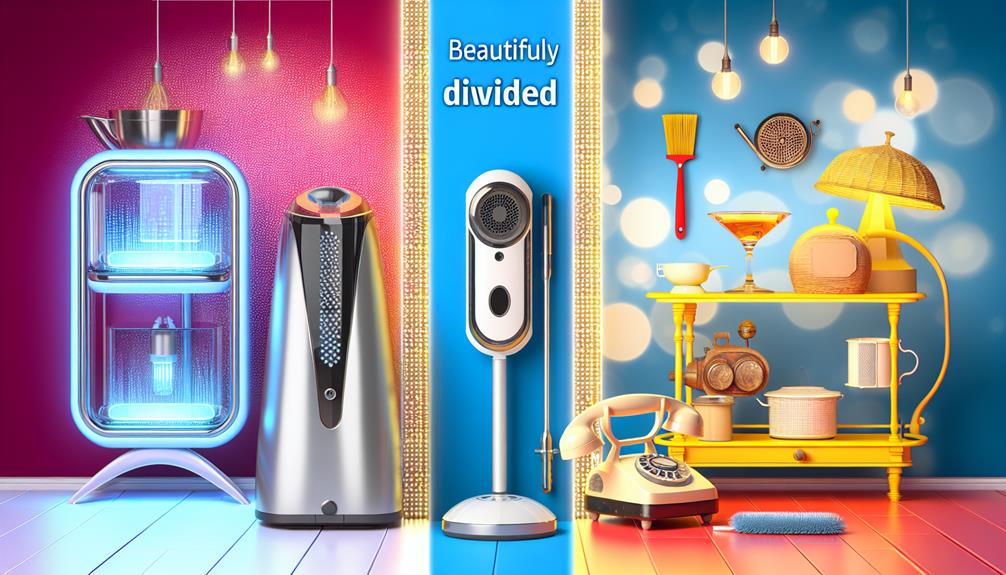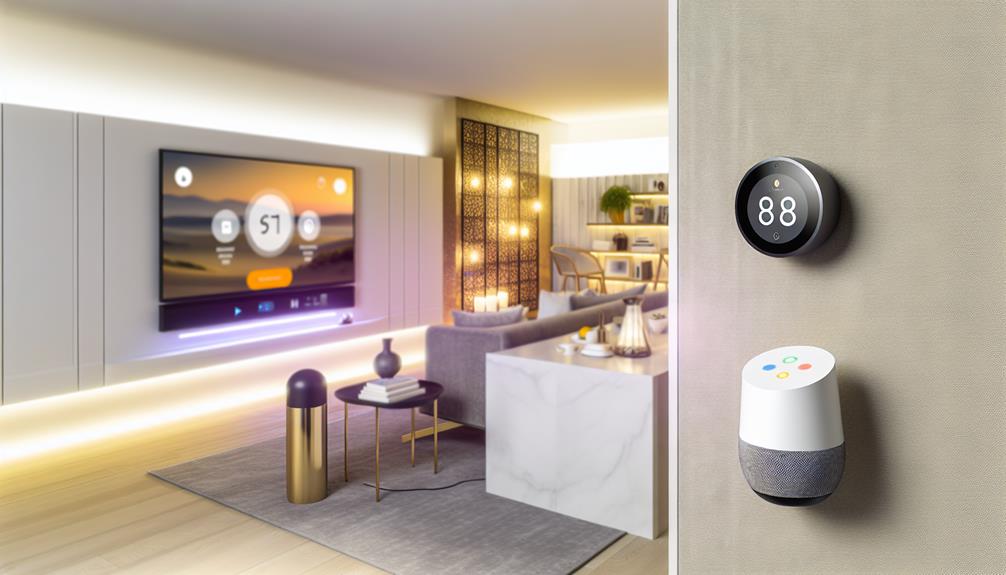Embracing the Future: Daily Life With Innovation
The integration of innovative technologies into our daily lives is not merely a trend; it represents a profound shift in how we interact with our environments. With the proliferation of smart home devices and AI-driven solutions, daily tasks are increasingly streamlined, promoting efficiency and sustainability. However, as we embrace these advancements, questions arise regarding their implications for privacy, security, and our overall quality of life. Exploring these dimensions reveals a complex landscape where convenience may come at a cost, prompting a closer examination of the balance we must strike in this evolving paradigm.
Key takeaways
- Smart home devices enhance daily convenience, allowing seamless control over lighting, climate, and security through voice commands and automation.
- AI integration personalizes user experiences, optimizing interactions with technology and anticipating needs for improved efficiency and satisfaction.
- Task management and time optimization tools automate repetitive activities, freeing up time for strategic initiatives and enhancing overall productivity.
- Energy management innovations, such as smart grids and meters, promote sustainable consumption and empower users to make informed energy decisions.
- Future trends like interoperability and predictive maintenance will create increasingly connected and efficient home environments tailored to individual preferences.
The Rise of Smart Home Devices
The advent of smart home devices marks a significant transformation in the way we interact with our living environments, underscoring the profound impact of technological innovation on daily life. As we embrace this new era, the integration of voice assistants and IoT ecosystems plays a pivotal role in enhancing home connectivity.
These devices facilitate seamless integration across various platforms, allowing for remote control of household functions, from lighting to climate control.
In this evolving landscape, user privacy remains an essential concern, prompting manufacturers to prioritize data security measures. Moreover, device compatibility guarantees that homeowners can easily incorporate new technologies into their existing setups, fostering a sense of belonging within a community increasingly reliant on smart solutions.
The benefits of energy efficiency and cost savings cannot be overlooked, as smart devices optimize usage patterns and reduce wastage. Additionally, personalized experiences are tailored to individual preferences, enhancing comfort and convenience.
Ultimately, the rise of smart home devices reflects a broader societal shift towards interconnected living, where innovation not only simplifies our routines but also enriches our lives, creating homes that are not just places to live, but dynamic environments that respond to our needs.
Benefits of AI Integration
Integrating artificial intelligence (AI) into daily life offers a multitude of advantages that considerably enhance efficiency and productivity across various sectors. One of the most notable benefits is the capability to provide personalized experiences. AI systems can analyze individual preferences and behaviors, allowing businesses to tailor services and products to meet specific needs. This level of customization fosters a deeper connection between consumers and brands.
Moreover, predictive analytics enables organizations to anticipate trends and consumer demands, optimizing resource allocation and strategic planning. By harnessing vast amounts of data, AI can identify patterns that human analysts might overlook, leading to more informed decision-making.
The table below illustrates key benefits of AI integration:
| Benefit | Description | Impact |
|---|---|---|
| Personalized Experiences | Tailored services and products | Increased customer loyalty |
| Predictive Analytics | Anticipates trends and behaviors | Improved efficiency |
| Automation | Streamlines repetitive tasks | Cost reduction |
| Data Insights | Enhanced data analysis capabilities | Informed decision-making |
Popular AI-Driven Gadgets
AI-driven gadgets have rapidly gained popularity, transforming everyday experiences and enhancing convenience in homes and workplaces. These innovations not only streamline tasks but also foster a sense of belonging by connecting users to their environments and to each other.
Among the most notable are voice assistants, which have become integral to daily life. Devices like Amazon Echo and Google Nest allow users to control smart home features, play music, and access information through simple voice commands, creating an interactive atmosphere that feels personal and responsive.
Simultaneously, wearable technology has emerged as a powerful tool for health monitoring and lifestyle management. Smartwatches and fitness trackers enable individuals to track their physical activity, heart rate, and even sleep patterns, fostering a community of health-conscious users who share their progress and motivate one another.
This blend of functionality and connectivity not only enhances personal well-being but also cultivates a sense of camaraderie among users.
As these AI-driven gadgets continue to evolve, their presence in our lives reflects a growing desire for seamless integration of technology, ultimately leading to a more connected and engaged society.
Enhancing Home Security
The integration of smart surveillance systems and automated alarm responses is revolutionizing home security.
These advanced technologies not only enhance real-time monitoring but also facilitate immediate reactions to potential threats, ensuring a safer living environment.
As homeowners increasingly adopt these innovations, the landscape of personal safety continues to evolve, offering unprecedented levels of protection and peace of mind.
Smart Surveillance Systems
In today's increasingly digital age, smart surveillance systems have emerged as a pivotal component of home security, offering homeowners an unprecedented level of control and peace of mind.
These advanced systems utilize high-definition cameras, motion detectors, and artificial intelligence to monitor properties in real time, providing alerts and insights that keep families informed and safe.
However, the rise of smart surveillance also brings forth significant privacy concerns. Homeowners must navigate the balance between security and the potential for invasive monitoring, as these systems often collect vast amounts of personal data.
This raises ethical implications regarding consent and the ownership of footage, especially when shared with third-party service providers.
Moreover, the question of surveillance overreach looms large. The integration of smart technology into daily life can lead to an environment where constant observation becomes the norm, potentially eroding the sense of personal privacy that many cherish.
As communities increasingly adopt these technologies, it is essential for users to remain vigilant and informed, ensuring that their pursuit of safety does not compromise the fundamental right to privacy.
Engaging in discussions around ethical practices will foster a sense of belonging and responsibility within neighborhoods.
Automated Alarm Responses
Automated alarm responses represent a significant advancement in enhancing home security, providing homeowners with immediate, actionable measures in the event of a breach.
These systems leverage cutting-edge technology, including voice recognition and adaptive learning, to create a more personalized and efficient security experience tailored to user preferences.
Key features of automated alarm responses include:
- Automated Notifications: Instant alerts sent to homeowners or designated contacts when a breach is detected, ensuring prompt action.
- Remote Monitoring: Users can access their security systems via smartphones, allowing for real-time surveillance from anywhere.
- Personalized Settings: Homeowners can configure the system according to their lifestyle, ensuring ideal security without unnecessary disruptions.
- Energy Efficiency: Advanced systems are designed to minimize power consumption while maintaining high levels of security.
However, as with any technological innovation, integration challenges and system compatibility with existing devices can arise.
Moreover, privacy concerns warrant careful consideration as automated systems evolve.
Streamlining Daily Tasks
The integration of smart home devices, task automation tools, and time management apps has revolutionized the way individuals approach daily tasks.
By leveraging these innovations, users can enhance efficiency and minimize the cognitive load associated with routine activities.
This seamless interplay of technology not only saves time but also fosters a more organized and productive lifestyle.
Smart Home Devices
Streamlining daily tasks has become increasingly feasible with the advent of smart home devices, which seamlessly integrate technology into everyday life. These innovations not only enhance convenience but also promote connectivity within IoT ecosystems.
With the power of voice assistants, users can efficiently manage multiple devices through simple voice control, making home automation a user-friendly experience.
Consider the following benefits of smart home devices:
- Smart Thermostats: Optimize energy consumption by learning user preferences and adjusting temperatures accordingly, ultimately reducing utility bills.
- Connected Appliances: Enable remote monitoring, allowing users to control and manage appliances from anywhere, enhancing both convenience and efficiency.
- Smart Lighting: Automate lighting schedules and adjust brightness through voice commands, fostering an inviting atmosphere tailored to personal needs.
- Enhanced User Privacy: By implementing robust security features, users can feel safe while enjoying the benefits of a connected home.
As we embrace these advancements, it is crucial to balance innovation with user privacy, ensuring a secure and sustainable future for our daily lives.
Smart home devices are not just tools; they represent a community of individuals seeking efficiency and belonging in a rapidly evolving world.
Task Automation Tools
In today's fast-paced world, task automation tools have emerged as essential allies in managing both personal and professional responsibilities. These innovative solutions enable individuals and organizations to streamline their workflows, facilitating effective task delegation and enhancing productivity. By automating repetitive tasks, users can allocate their time and energy to more strategic initiatives, fostering a sense of accomplishment and belonging within their teams.
Workflow optimization is a critical benefit of task automation tools, as they allow for the seamless integration of various processes. For example, automatic scheduling, email responses, and data entry can greatly reduce the cognitive load on individuals, enabling them to focus on higher-order thinking and creative problem-solving.
As team members witness the tangible benefits of these tools, a collaborative culture can thrive, reinforcing a shared commitment to efficiency and innovation.
Moreover, the accessibility of task automation tools has democratized productivity, allowing individuals from all backgrounds to harness technology in their daily lives. As we embrace these advancements, we cultivate a community that not only values efficiency but also nurtures connection, collaboration, and mutual support in the pursuit of our shared goals.
Time Management Apps
Balancing the demands of daily life often feels like juggling multiple responsibilities, and time management apps have emerged as powerful tools to help individuals regain control over their schedules.
These applications not only assist in organizing tasks but also enhance productivity through innovative techniques like time blocking and various productivity hacks.
To optimize your use of time management apps, consider the following strategies:
- Set Clear Goals: Define what you want to achieve daily, weekly, and monthly, ensuring your tasks align with your objectives.
- Prioritize Tasks: Use the app's features to categorize tasks by urgency and importance, allowing for better focus on what truly matters.
- Implement Time Blocking: Allocate specific time slots for various activities, minimizing distractions and fostering a more structured approach to your day.
- Review and Adjust: Regularly assess your progress and adjust your strategies as needed, ensuring continuous improvement and adaptability.
Incorporating these practices into your daily routine can foster a sense of belonging within your community, as you share insights and experiences with others aiming for the same goal—mastering the art of time management.
Energy Management Innovations
Energy management innovations are transforming the way individuals and organizations approach their consumption and generation of power. With the increasing adoption of renewable energy sources, such as solar and wind, there is a growing emphasis on energy efficiency and sustainable living.
Smart grids play a pivotal role by enhancing the reliability and efficiency of electricity distribution, allowing for real-time data exchange between utilities and consumers.
Demand response programs empower users to adjust their energy consumption during peak times, reducing strain on the grid while lowering their carbon footprint. Coupled with advanced energy storage solutions, these innovations guarantee that excess energy generated during peak production times can be efficiently stored and utilized later.
Smart meters are revolutionizing energy monitoring, providing users with detailed insights into their consumption patterns, enabling informed power management decisions. This level of transparency fosters a sense of community among users who are committed to reducing energy waste.
Ultimately, these energy management innovations not only promote a more sustainable future but also foster a collaborative environment where individuals and organizations work to minimize their environmental impact together.
Future Trends in Home Automation
As energy management innovations pave the way for more sustainable living, the evolution of home automation systems is set to redefine how we interact with our living spaces. The future promises a more integrated and intuitive environment, where technology works harmoniously with our daily lives.
Key trends are emerging that underscore this shift:
- Voice Control: The proliferation of smart speakers and voice assistants is making it easier for homeowners to manage their devices effortlessly, creating a more inclusive atmosphere for all family members.
- Predictive Maintenance: Advanced algorithms will predict appliance failures before they occur, ensuring that homes operate smoothly and efficiently, reducing downtime and enhancing comfort.
- Interoperability: Future systems will increasingly allow different devices from various manufacturers to work together seamlessly, creating a holistic smart home experience.
- Personalization: Home automation will evolve to learn user preferences over time, tailoring environments to individual needs and fostering a sense of belonging.
These trends reflect a broader movement towards smarter, more connected homes that not only enhance convenience but also promote a sustainable lifestyle, allowing us to thrive in our living spaces.
Frequently Asked Questions
How Do Smart Devices Impact Energy Consumption in Homes?
Smart devices revolutionize energy consumption, transforming homes into eco-friendly sanctuaries. With energy efficiency in mind, smart thermostats, automated lighting, and consumption tracking work harmoniously to optimize usage, fostering a sustainable lifestyle that resonates with collective responsibility.
Are There Privacy Concerns With AI Home Assistants?
Privacy concerns surrounding AI home assistants primarily revolve around data security and user consent. Users must be informed about data collection practices and have control over their information to foster trust and guarantee responsible usage of these technologies.
What Is the Cost of Setting up a Smart Home?
Setting up a smart home requires careful budget planning, as installation costs can vary considerably based on the complexity of the system and the number of devices integrated. Understanding these factors guarantees a more informed investment.
Can Smart Home Devices Be Hacked?
Smart home devices can indeed be hacked due to device vulnerabilities and hacker motivations. To safeguard your home, prioritize smart security, implement strong passwords, and regularly update software to enhance protection measures against potential threats.
How Do I Choose the Right AI Gadget for My Needs?
To select the right AI gadget, assess AI compatibility, user interface, and functionality comparison. Consider brand reputation and device longevity while ensuring the price range aligns with your budgetary constraints for maximum satisfaction.



